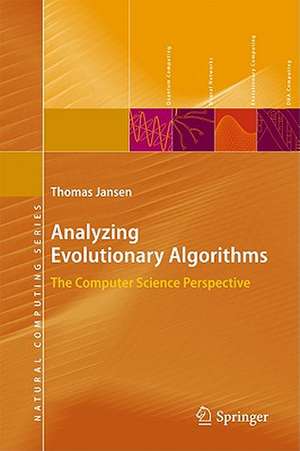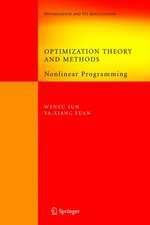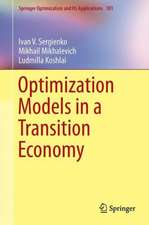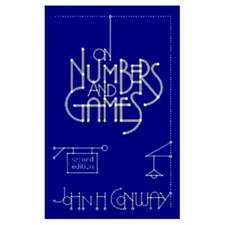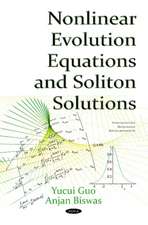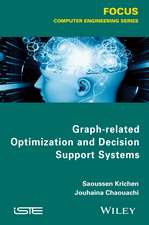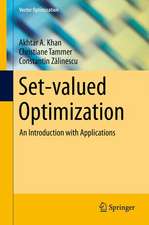Analyzing Evolutionary Algorithms: The Computer Science Perspective: Natural Computing Series
Autor Thomas Jansenen Limba Engleză Hardback – 19 dec 2012
In this book the author provides an introduction to the methods used to analyze evolutionary algorithms and other randomized search heuristics. He starts with an algorithmic and modular perspective and gives guidelines for the design of evolutionary algorithms. He then places the approach in the broader research context with a chapter on theoretical perspectives. By adopting a complexity-theoretical perspective, he derives general limitations for black-box optimization, yielding lower bounds on the performance of evolutionary algorithms, and then develops general methods for deriving upper and lower bounds step by step. This main part is followed by a chapter covering practical applications of these methods.
The notational and mathematical basics are covered in an appendix, the results presented are derived in detail, and each chapter ends with detailed comments and pointers to further reading. So the book is a useful reference for both graduate students and researchers engaged with the theoretical analysis of such algorithms.
| Toate formatele și edițiile | Preț | Express |
|---|---|---|
| Paperback (1) | 311.10 lei 38-44 zile | |
| Springer Berlin, Heidelberg – 29 ian 2015 | 311.10 lei 38-44 zile | |
| Hardback (1) | 322.43 lei 38-44 zile | |
| Springer Berlin, Heidelberg – 19 dec 2012 | 322.43 lei 38-44 zile |
Din seria Natural Computing Series
- 20%
 Preț: 507.38 lei
Preț: 507.38 lei - 20%
 Preț: 305.91 lei
Preț: 305.91 lei - 20%
 Preț: 992.26 lei
Preț: 992.26 lei - 20%
 Preț: 617.14 lei
Preț: 617.14 lei - 20%
 Preț: 645.47 lei
Preț: 645.47 lei - 20%
 Preț: 642.65 lei
Preț: 642.65 lei - 20%
 Preț: 998.04 lei
Preț: 998.04 lei - 18%
 Preț: 963.60 lei
Preț: 963.60 lei - 20%
 Preț: 655.20 lei
Preț: 655.20 lei - 20%
 Preț: 615.70 lei
Preț: 615.70 lei - 20%
 Preț: 645.65 lei
Preț: 645.65 lei - 20%
 Preț: 640.19 lei
Preț: 640.19 lei - 20%
 Preț: 655.02 lei
Preț: 655.02 lei -
 Preț: 384.70 lei
Preț: 384.70 lei - 20%
 Preț: 652.54 lei
Preț: 652.54 lei - 20%
 Preț: 649.28 lei
Preț: 649.28 lei - 20%
 Preț: 330.75 lei
Preț: 330.75 lei - 20%
 Preț: 328.09 lei
Preț: 328.09 lei -
 Preț: 389.70 lei
Preț: 389.70 lei - 20%
 Preț: 644.66 lei
Preț: 644.66 lei - 20%
 Preț: 333.88 lei
Preț: 333.88 lei - 20%
 Preț: 1299.31 lei
Preț: 1299.31 lei - 20%
 Preț: 528.47 lei
Preț: 528.47 lei - 20%
 Preț: 648.11 lei
Preț: 648.11 lei - 15%
 Preț: 639.90 lei
Preț: 639.90 lei - 20%
 Preț: 657.83 lei
Preț: 657.83 lei - 20%
 Preț: 659.31 lei
Preț: 659.31 lei - 20%
 Preț: 997.56 lei
Preț: 997.56 lei - 20%
 Preț: 508.61 lei
Preț: 508.61 lei -
 Preț: 400.85 lei
Preț: 400.85 lei - 20%
 Preț: 653.38 lei
Preț: 653.38 lei - 20%
 Preț: 308.60 lei
Preț: 308.60 lei - 20%
 Preț: 654.05 lei
Preț: 654.05 lei - 15%
 Preț: 652.17 lei
Preț: 652.17 lei - 20%
 Preț: 336.54 lei
Preț: 336.54 lei - 20%
 Preț: 656.19 lei
Preț: 656.19 lei
Preț: 322.43 lei
Preț vechi: 403.04 lei
-20% Nou
Puncte Express: 484
Preț estimativ în valută:
61.71€ • 64.18$ • 50.94£
61.71€ • 64.18$ • 50.94£
Carte tipărită la comandă
Livrare economică 08-14 aprilie
Preluare comenzi: 021 569.72.76
Specificații
ISBN-13: 9783642173387
ISBN-10: 3642173381
Pagini: 268
Ilustrații: X, 258 p.
Dimensiuni: 155 x 235 x 23 mm
Greutate: 0.55 kg
Ediția:2013
Editura: Springer Berlin, Heidelberg
Colecția Springer
Seria Natural Computing Series
Locul publicării:Berlin, Heidelberg, Germany
ISBN-10: 3642173381
Pagini: 268
Ilustrații: X, 258 p.
Dimensiuni: 155 x 235 x 23 mm
Greutate: 0.55 kg
Ediția:2013
Editura: Springer Berlin, Heidelberg
Colecția Springer
Seria Natural Computing Series
Locul publicării:Berlin, Heidelberg, Germany
Public țintă
ResearchCuprins
Introduction.- Evolutionary Algorithms and Other Randomized Search Heuristics.- Theoretical Perspectives on Evolutionay Algorithms.- General Limits in Black-Box Optimization.- Methods for the Analysis of Evolutionary Algorithms.- Selected Topics in the Analysis of Evolutionary Algorithms.- App. A, Landau Notation.- App. B, Tail Estimations.- App. C, Martingales and Applications.
Recenzii
From the book reviews:
“This book focuses on the theoretical analysis of evolutionary algorithms as one of the randomized algorithms in computer science. … This book serves as a very useful source for researchers who are interested in exploring these challenging topics. … I highly recommend it for anyone who is looking to explore both the theoretical aspects of evolutionary algorithms and the practical aspects of designing more efficient algorithms.” (R. Qu, Interfaces, Vol. 44 (4), July-August, 2014)
“‘Analyzing evolutionary algorithms’ is a beautiful book that has a lot to offer to people with different backgrounds. It not only explains evolutionary algorithms and puts them into relationship with other randomized search algorithms, it also provides detailed information for specialists who want to understand in depth how, why, and when evolutionary algorithms work. … The book is complemented by an extended list of references and suggestions for further reading.” (Manfred Kerber, zbMATH, Vol. 1282, 2014)
“This textbook provides a self-contained introduction into this exciting research subject. It can be used as a course text for advanced undergraduate or graduate levels, and it is at the same time a much welcome reference book for active researchers in this area. … Each chapter is therefore complemented by a remarks section that briefly summarizes the advances in the respective topics. In many cases pointers are given to recent research reports.” (Carola Doerr, Mathematical Reviews, October, 2013)
“Analyzing Evolutionary Algorithms is aimed at evolutionary computation researchers and enthusiasts who are interested in the theoretical analysis of evolutionary algorithms. It will be accessible to post-graduates and advanced undergraduates in mathematics and/or computer science, and generally anyone with a working background in discrete mathematics, algorithms, and basic probability theory. Theoreticianswill benefit from this book because it works well as a convenient reference for essential analytical strategies and many up-to-date results.” (Andrew M. Sutton, Genetic Programming and Evolvable Machines, Vol. 14, 2013)
“This book focuses on the theoretical analysis of evolutionary algorithms as one of the randomized algorithms in computer science. … This book serves as a very useful source for researchers who are interested in exploring these challenging topics. … I highly recommend it for anyone who is looking to explore both the theoretical aspects of evolutionary algorithms and the practical aspects of designing more efficient algorithms.” (R. Qu, Interfaces, Vol. 44 (4), July-August, 2014)
“‘Analyzing evolutionary algorithms’ is a beautiful book that has a lot to offer to people with different backgrounds. It not only explains evolutionary algorithms and puts them into relationship with other randomized search algorithms, it also provides detailed information for specialists who want to understand in depth how, why, and when evolutionary algorithms work. … The book is complemented by an extended list of references and suggestions for further reading.” (Manfred Kerber, zbMATH, Vol. 1282, 2014)
“This textbook provides a self-contained introduction into this exciting research subject. It can be used as a course text for advanced undergraduate or graduate levels, and it is at the same time a much welcome reference book for active researchers in this area. … Each chapter is therefore complemented by a remarks section that briefly summarizes the advances in the respective topics. In many cases pointers are given to recent research reports.” (Carola Doerr, Mathematical Reviews, October, 2013)
“Analyzing Evolutionary Algorithms is aimed at evolutionary computation researchers and enthusiasts who are interested in the theoretical analysis of evolutionary algorithms. It will be accessible to post-graduates and advanced undergraduates in mathematics and/or computer science, and generally anyone with a working background in discrete mathematics, algorithms, and basic probability theory. Theoreticianswill benefit from this book because it works well as a convenient reference for essential analytical strategies and many up-to-date results.” (Andrew M. Sutton, Genetic Programming and Evolvable Machines, Vol. 14, 2013)
Notă biografică
The author lectured and researched in the Technische Universität Dortmund for 9 years after his PhD, and he is now the Stokes College Lecturer in the Department of Computer Science in University College Cork. He has tested the book content in his own lectures at these universities, and he has been invited to run the tutorial on this subject at the main international conference on evolutionary computing, GECCO.
Textul de pe ultima copertă
Evolutionary algorithms is a class of randomized heuristics inspired by natural evolution. They are applied in many different contexts, in particular in optimization, and analysis of such algorithms has seen tremendous advances in recent years.
In this book the author provides an introduction to the methods used to analyze evolutionary algorithms and other randomized search heuristics. He starts with an algorithmic and modular perspective and gives guidelines for the design of evolutionary algorithms. He then places the approach in the broader research context with a chapter on theoretical perspectives. By adopting a complexity-theoretical perspective, he derives general limitations for black-box optimization, yielding lower bounds on the performance of evolutionary algorithms, and then develops general methods for deriving upper and lower bounds step by step. This main part is followed by a chapter covering practical applications of these methods.
The notational and mathematical basics are covered in an appendix, the results presented are derived in detail, and each chapter ends with detailed comments and pointers to further reading. So the book is a useful reference for both graduate students and researchers engaged with the theoretical analysis of such algorithms.
In this book the author provides an introduction to the methods used to analyze evolutionary algorithms and other randomized search heuristics. He starts with an algorithmic and modular perspective and gives guidelines for the design of evolutionary algorithms. He then places the approach in the broader research context with a chapter on theoretical perspectives. By adopting a complexity-theoretical perspective, he derives general limitations for black-box optimization, yielding lower bounds on the performance of evolutionary algorithms, and then develops general methods for deriving upper and lower bounds step by step. This main part is followed by a chapter covering practical applications of these methods.
The notational and mathematical basics are covered in an appendix, the results presented are derived in detail, and each chapter ends with detailed comments and pointers to further reading. So the book is a useful reference for both graduate students and researchers engaged with the theoretical analysis of such algorithms.
Caracteristici
The results presented are derived in detail A useful reference for both graduate students and researchers Each chapter ends with detailed comments and pointers to further reading Includes supplementary material: sn.pub/extras
